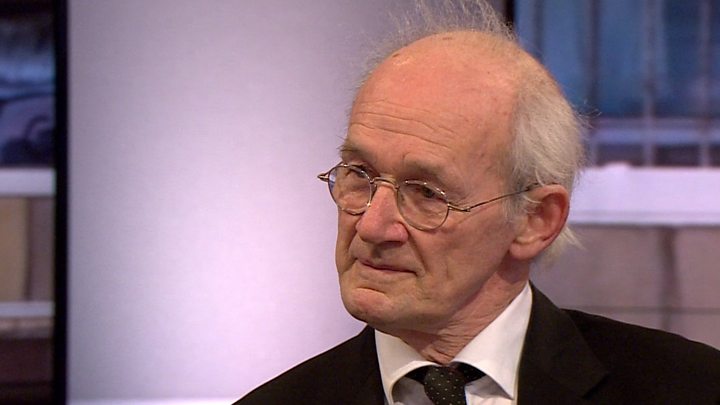 Image copyright Getty Images
Image copyright Getty Images Wikileaks founder Julian Assange’s extradition hearing has opened in a London court.
The US says he is guilty of hacking into and publishing US military databases, but he says the case is politically motivated.
So, what is extradition and how does it work?
What is Julian Assange accused of doing?
Assange is accused of conspiring to hack into US military databases to acquire sensitive secret information, which was then published on the Wikileaks website.
He says the information exposed abuses by the US military. US prosecutors say the leaks of classified material endangered lives, and so the US is seeking his extradition from the UK, where he is currently in prison.
Assange had spent almost seven years inside the Ecuadorian embassy in London, saying he was a victim of human-rights abuses and would face a life sentence if extradited.
At the time he fled to the embassy, he had been facing extradition to Sweden on allegations of sexual assault – a case that was later dropped.
What is extradition?
Extradition is the internationally recognised legal process under which one country can ask another to hand over a suspect to face trial.
It is one of the cornerstones of justice in the modern world. It helps nations to co-operate in tracking down criminals, and to then send them to face trial in the country where their offences were committed.
How is extradition agreed between countries?
Extradition is governed by treaties – the legal agreements between states – and then specific laws within each country. Those treaties and local laws set out the circumstances and rules for extradition.
Some nations have very tight rules – Germany’s constitution, for instance, allows only the extradition of its own citizens to other EU states or international courts.
The European Union has a unique system that means it is really easy and fast for one member state to send a criminal to another to face trial. The UK remains part of that system until the end of the Brexit transition period on 31 December.
So how does extradition from the UK to the US work?
Every time the United States wants to put a suspect who is in the UK on trial, its prosecutors ask the British government. If the request has been made correctly, the home secretary sends it on to the courts, which then issue a warrant for the suspect to be found and arrested.
Once the individual has been detained, a judge examines the request. The judge must be satisfied that the individual is definitely the suspect the US is after and that the alleged crime is an offence that could lead to trial in the UK, had the incident happened on its territory.
The judge must also consider other bars to extradition, such as whether the person has already been prosecuted for the crime or whether the offence happened in a different country entirely.

Media playback is unsupported on your device
Under UK law, Parliament has banned extraditing anyone to face a trial in a country that has the death penalty unless the requesting nation has promised not to impose it.
Once the judge has reviewed the application, the final decision on extradition to the US is made by the home secretary. The suspect can, however, appeal against extradition if they believe the process has been flawed – and that could involve hearings lasting more than a year. They could go all the way to the UK Supreme Court or European Court of Human Rights.
In 2012, a log-jam on extradition to the US was broken after the European Court ruled that life sentences there in allegedly harsh conditions did not breach human rights.
Do the two countries always approve requests?
The UK has historically blocked a number of extraditions to the US on human-rights grounds – the most significant case being that of Gary McKinnon. The self-confessed hacker was wanted for targeting US government computers, but in 2012 the government barred his extradition, saying he was too ill to face trial abroad.
In January 2020, the US turned down an extradition request for Anne Sacoolas to face trial in the UK. She was accused of causing the death of teenage motorcyclist Harry Dunn. The US said she could not be extradited because she had diplomatic immunity from prosecution for a crime overseas.
Must evidence of guilt be provided for extradition?
No. Under British law, many nations do not have to provide our judges with detailed, or “prima facie”, evidence that the suspect is guilty.
What this means in practice is that a British judge does not need to be sure that the individual would be convicted at the end of a trial.
The requesting nations in this category are simply required to explain to our courts that there is a case that needs answering – and our judges take their word for it.
That is because the UK has concluded that each of these countries – which includes the US – has laws and safeguards in place that guarantee independent judges and a legal right to a fair trial.
Other nations would have to provide fuller evidence of their case to a British court.
In contrast, the US will not send someone to face trial in the UK before its judges are sure the evidence is strong. That is because the US Constitution says nobody can be arrested and detained without proof of “probable cause” – a standard legal test in all its criminal cases.
Click Here to Visit Orignal Source of Article https://www.bbc.co.uk/news/explainers-51586120

